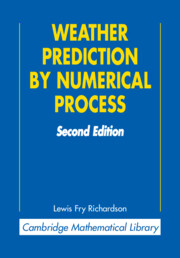Book contents
- Frontmatter
- FOREWORD
- Contents
- PREFACE
- GUIDING SIGNS
- CHAP. I SUMMARY
- CHAP. II INTRODUCTORY EXAMPLE
- CHAP. III THE CHOICE OF COORDINATE DIFFERENCES
- CHAP. IV THE FUNDAMENTAL EQUATIONS
- CHAP. V FINDING THE VERTICAL VELOCITY
- CHAP. VI SPECIAL TREATMENT FOR THE STRATOSPHERE
- CHAP. VII THE ARRANGEMENT OF POINTS AND INSTANTS
- CHAP. VIII REVIEW OF OPERATIONS IN SEQUENCE
- CHAP. IX AN EXAMPLE WORKED ON COMPUTING FORMS
- CHAP. X SMOOTHING THE INITIAL DATA
- CHAP. XI SOME REMAINING PROBLEMS
- CHAP. XII UNITS AND NOTATION
- INDEX OF PERSONS
- INDEX OF SUBSIDIARY SUBJECTS
CHAP. I - SUMMARY
Published online by Cambridge University Press: 06 July 2010
- Frontmatter
- FOREWORD
- Contents
- PREFACE
- GUIDING SIGNS
- CHAP. I SUMMARY
- CHAP. II INTRODUCTORY EXAMPLE
- CHAP. III THE CHOICE OF COORDINATE DIFFERENCES
- CHAP. IV THE FUNDAMENTAL EQUATIONS
- CHAP. V FINDING THE VERTICAL VELOCITY
- CHAP. VI SPECIAL TREATMENT FOR THE STRATOSPHERE
- CHAP. VII THE ARRANGEMENT OF POINTS AND INSTANTS
- CHAP. VIII REVIEW OF OPERATIONS IN SEQUENCE
- CHAP. IX AN EXAMPLE WORKED ON COMPUTING FORMS
- CHAP. X SMOOTHING THE INITIAL DATA
- CHAP. XI SOME REMAINING PROBLEMS
- CHAP. XII UNITS AND NOTATION
- INDEX OF PERSONS
- INDEX OF SUBSIDIARY SUBJECTS
Summary
Finite arithmetical differences have proved remarkably successful in dealing with differential equations; for instance, approximate particular solutions of the equation for the diffusion of heat ∂2θ/∂x2 = ∂θ/∂t can be obtained quite simply and without any need to bring in Fourier analysis. An example is worked out in a paper published in Phil. Trans. A, Vol. 210. In this book it is shown that similar methods can be extended to the very complicated system of differential equations, which expresses the changes in the weather. The fundamental idea is that atmospheric pressures, velocities, etc. should be expressed as numbers, and should be tabulated at certain latitudes, longitudes and heights, so as to give a general account of the state of the atmosphere at any instant, over an extended region, up to a height of say 20 kilometres. The numbers in this table are supposed to be given, at a certain initial instant, by means of observations.
It is shown that there is an arithmetical method of operating upon these tabulated numbers, so as to obtain a new table representing approximately the subsequent state of the atmosphere after a brief interval of time, δt say. The process can be repeated so as to yield the state of the atmosphere after 2δt, 3δt and so on. There is a limit however to the possible number of repetitions, because each table is found to be smaller than its predecessor, in longitude and latitude, having lost a strip round its edge.
- Type
- Chapter
- Information
- Weather Prediction by Numerical Process , pp. 1 - 3Publisher: Cambridge University PressPrint publication year: 2007



